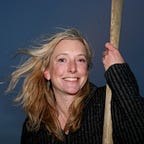Navigating a Post-Truth World
Sometimes we can agree to disagree
Do you believe the Earth is flat? Do you believe the world is run by a powerful and malevolent cabal? Do you believe the creation as described in the Bible is literally true?
I know people who believe these things. I don’t agree with them, and we can enjoy some lively debates about their truth versus my truth, but I always treat them with respect — that is, I treat the people with respect, even if not their beliefs.
Because how do I know? How do I really know that what I believe is true? And how do I know for sure that what they believe is wrong?
And how do I expect to be treated if somebody thinks that my beliefs are bonkers?
These thoughts follows on from last week’s post about how humans use story to navigate the world, to organise ourselves, even to define who we believe ourselves to be, individually and collectively.
Last weekend I was volunteering at a Buddhist retreat centre, and some really interesting topics came up in conversation. It made me marvel, once again, at how different people can have access to the same facts and come up with such different interpretations.
Of course I think that my perspective is the sane, rational, science-based one. But I can also see why other people believe their view is correct — even the British Journal of Medicine has admitted that science (medicine in particular) is not as objective as it purports to be. Scientists are as susceptible to confirmation bias, availability heuristics, status quo bias — and the availability of funding — as anybody else.
When I’ve waded into any specific area of science — at various times I’ve had cause to investigate sports nutrition, climate science, rising sea levels, and so on — the deeper I dive, the more complex, ambiguous, and open to interpretation the situation becomes. When politicians stated confidently during the pandemic that they were going to “follow the science”, we have to ask: whose science?
With pandemics, as with climate change, we don’t need to wait for 100% consensus before taking action, but it’s important to also remember that reality gets complicated, with multiple variables acting and interacting within a complex system, so it’s important not to take the matter as settled when it’s not. Science is, and always should be, evolving.
While at the Buddhist centre, I happened to carelessly mention that I was going to see Russell Brand do a live gig this week, thinking he might be sufficiently counter-cultural for their tastes, only to be told that he is part of the paid opposition, that the powers-that-be control not just the proponents of the mainstream narrative, but also the proponents of the counter-narrative, in order to maintain their absolutely dominance of public discourse.
At that point I had to metaphorically throw my hands in the air. We need at least some anchor points in reality if we’re not to become completely untethered. It made me think about what happens when people lose trust in authority, so that almost anything that they read or hear in the mainstream media becomes open to question, the object of suspicion. Many organisations are not trustworthy, and we absolutely should bring our critical thinking faculties to bear, but questioning absolutely everything becomes quite exhausting.
So how do we navigate this post-truth era?
My personal guidelines are still emergent, but here’s what I’ve got so far:
- Exercise critical thinking on a regular basis, especially where a profit motive is in play. Follow the money.
- Use discernment (taking information from heart and gut as well as head) to figure out what seems true, but be open to reconsidering as and when further information emerges.
- Consider the consequences of this belief versus that belief — who and what will be impacted, and in what ways?
- Remember that being right never won an argument. Questions are more persuasive than dogma.
- Opposing views will probably both be partly wrong, and partly right — the truth usually lies somewhere in between, and is more complicated than we would like.
As Kimberly Carter Gamble said on my podcast last year, we humans have to learn how to disagree well. I can’t imagine a time when all humans will agree on everything. We need contrast in order to learn and grow. And it would be a very boring life if everybody vehemently agreed with each other all the time.
But we often take it so personally when somebody disagrees with our beliefs. If the disagreement is going to have serious adverse consequences for the wellbeing of people or planet, then sure, we need to pursue a resolution that doesn’t endanger our collective future.
But we waste a lot of time and energy disagreeing about things that don’t ultimately matter all that much, simply because our ego is affronted that someone else is seeing the world differently than we do, and it feels the need to assert that we are right and they are wrong. There are more than enough really consequential conflicts in the world without picking unnecessary fights.
It’s often not disagreement that does the harm, but what people do to try and force others to agree with their own view. Sometimes, we need to simply agree to disagree.
Originally published at https://www.rozsavage.com on August 4, 2022.
